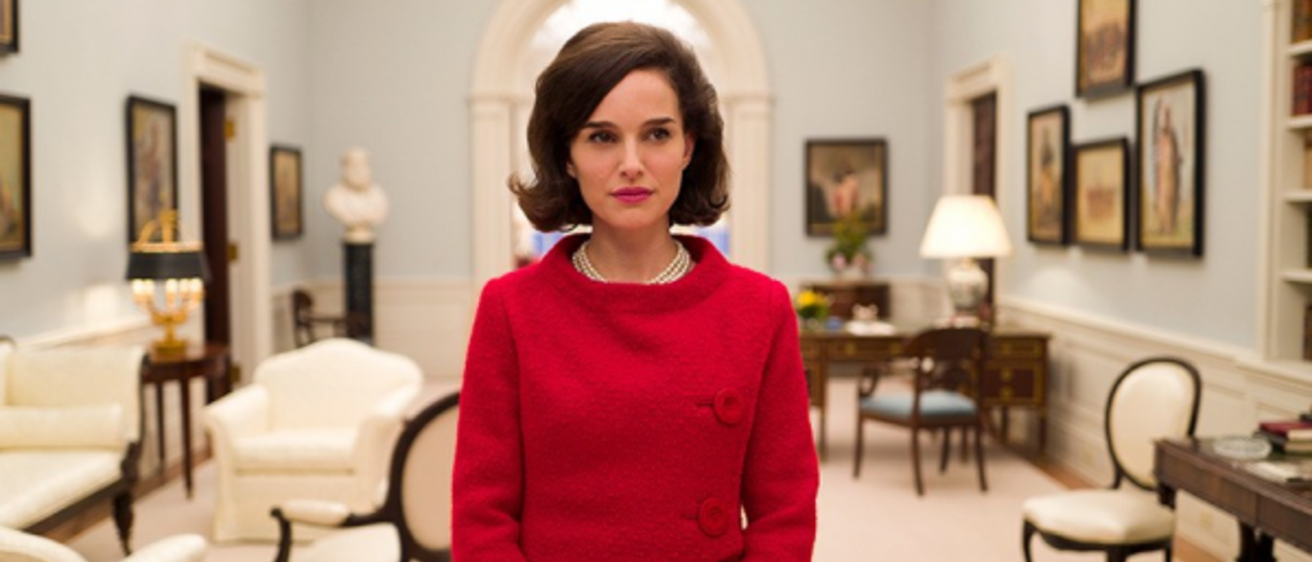By Amanda Bartlett
“The darkness may never go away” the priest says, knowingly. “But it won’t always be this heavy.”
It is dusk. First lady Jacqueline Kennedy (flawlessly portrayed by Natalie Portman, whose performance was nominated for a Golden Globe for Best Actress) and a priest (played by John Hurt) walk side by side in a park just outside of the White House. It’s nearly a week after Jackie's husband, President John F. Kennedy, was assassinated. That day, and every day since, she confides to the priest that she’s prayed to die.
Cameras flashed and crowds cheered on that sunny afternoon in Dallas as JFK, Jackie, and Texas governor John Connally and his wife Nellie made their way through Dealey Plaza in a presidential motorcade. And then… Boom. Boom. As the first and then the second bullets ring out, the film withholds none of the visceral horror experienced by all who were present, particularly Jackie as she frantically claws her way to the rear-bumper to the car, hanging on for her life.
Arguably one of the most culturally and politically significant events in American history, JFK’s assassination and its aftermath had a profound impact that changed the U.S. forever. It was a time when television began to surpass newspapers. The dawn of the conspiracies era was born. And yet, Jackie isn’t really about any of that. Rather, the film provides an intimate glimpse into Jackie’s public and private life as she struggles to fight through grief and addiction while comforting her children and arranging a state funeral that will convey appropriate grandiosity after her husband’s death.
It’s a biopic without really presenting the qualities of a biopic at all. Instead of offering the viewer a manicured, toned-down version of a true story, Jackie spares none of the messiness. We watch as she refuses to remove her emblematic pink Chanel suit—now bloodstained—on board of Air Force One when she stands alongside Lyndon B. Johnson as he takes the oath of office as President.
“I want them to see what they’ve done to Jack,” she says, gravely.
The remainder of the film is a stunning juxtaposition of her poise and bravery in the public eye, along with her vulnerability and anguish as she crumbles behind closed doors. Submitting to alcoholism and suicidal thoughts, she tells the priest that she struggles to find purpose in her life following the death of her husband.
“There comes a time in man’s search for meaning,” he tells her, “when one realizes, there are no answers.”
Jackie is most notable for its raw affect; what it does not spare the beholder, which makes it an essential viewing. Though grief is in fact an impending part of the human experience as it unspools; too often, it can be depicted as a sign of weakness.
And then there's Jackie Kennedy. We see someone—who is normally portrayed as a symbol of style and elegance—gain the credit she deserves for her exceptional understanding of image and public relations. Despite dealing with moving out of what was really her only home and contemplating a whole different life as she moved forward, Jackie was able to solidify her husband’s legacy and show us what it is to have the noblest grace under fire.
Simply put, Jackie is a film about one of the most famous first ladies in U.S. history. But it sets the precedent for film in 2017 in a lot of ways. As a viewer, it gave me hope for issues of grief and mental health to be discussed more openly. Movies like Jackie are crucial because they show us that it’s okay to talk honestly about our feelings and our humanness, as well as the importance of being more comfortable with the uncomfortable. Tragedies can happen to all of us, and they make us feel small and invisible and alone. But, Jackie offers an intimate glimpse into the humanity of such a powerful figure, allowing us to see that it is through moments of vulnerability that we can find strength, and ultimately, triumph.
Jackie opens at FilmScene on Friday, January 27.
Amanda Bartlett is the marketing director of the Bijou Film Board and is fascinated by U.S. history. If you are, too, she hopes that you check out Bijou Film Forum's upcoming screening of 13th, an in-depth look at the prison system in the United States and how it reveals the nation's history of racial inequality.
